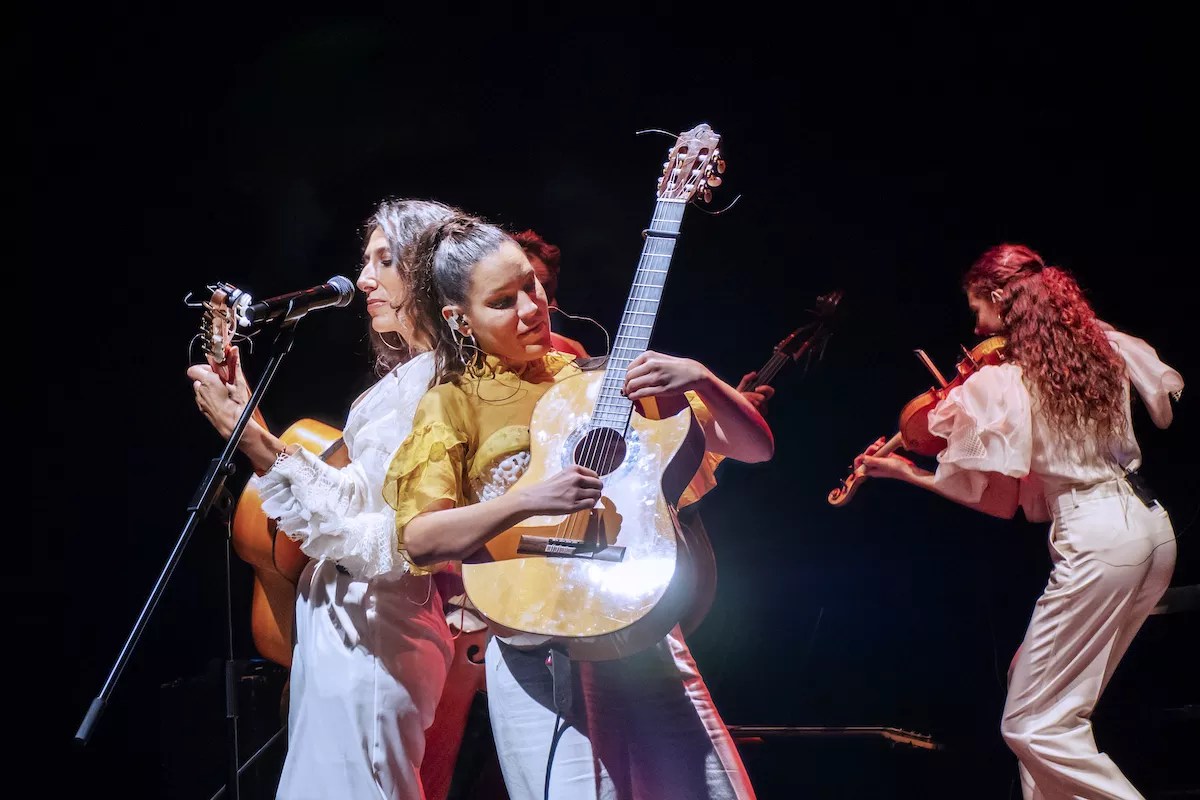
Photo by Anal

Audio By Carbonatix
If the South Florida air feels different, it may be because the Barcelona-based flamenco group Las Migas has blown in from the Mediterranean. The four-women powerhouse brings its fresh and sunny take on Spanish rhythms to the Miami-Dade County Auditorium on Saturday, May 20.
The concert will showcase the group’s latest album, Libres, winner of the 2022 Latin Grammy Award for “Best Flamenco Album.” It’s an eclectic collection of tunes that takes listeners on a tour of American genres such as country, rap, pop, and jazz, all lending their different flavors to a flamenco that is as lighthearted and fun as carefully crafted.
The album’s title, Libres, sums up how the quartet feels about their art: music should be about being free – mixing and mingling and combining influences from other styles and idioms. And while flamenco is an ancient art form, steeped in tradition and bound by rules, singers from the legendary Camarón de la Isla to Spanish phenom Rosalía have been bending the rules and breaking with tradition for decades. Las Migas has been a part of this flamenco evolution since the band’s inception in 2004, and Libres is their latest rallying cry for artistic freedom.
When Las Migas started, it was a group of classically trained female musicians from Barcelona’s prestigious Escuela Superior de Música with a mutual interest in taking a deep dive into flamenco. Composer, guitarist, and singer Marta Robles, the only extant member of that original band, says theirs was not so much a grand plan as an informal proposition.
“We felt like finding out more about the flamenco world and wanted to make music together,” says Robles. “That’s how Las Migas came about, in a very casual way. But it worked really well.” The women realized they were onto something when the concert dates kept coming in.
As with Motown groups like the Temptations or the Supremes, Las Migas has kept its signature sound despite the departure and arrival of different performers in its nearly 20-year trajectory.
Silvia Pérez Cruz, now a star in her own right, got her start as one of the group’s founding members before branching off for a career as a solo artist. Changing and rearranging with each new permutation of the band, the constant for Las Migas has always been the music, which maintains at its core a delicious blending of vocal harmonies on a guitar-rich base. Added to the mix is a single violin, a less-common sound for flamenco that helps give Las Migas a unique flavor.
“Las Migas without a violin wouldn’t be Las Migas,” says Robles. Laura Pacios, one of the newer members of the band, is classically trained but chameleonic, on one track sounding like she’s onstage at a postwar Paris jazz club, on another sounding like she just stepped off the tour bus of country female supergroup the Highwomen.
Like her co-conspirators, when Pacios isn’t playing, she’s singing.
“Normally, the voice really defines a band,” says Robles. “For us, the voice is important for us, but so are the guitars and the violin.” In addition to Pacios and Robles, guitarist and singer Alicia Grillo and singer and dancer Carolina “La Chispa” Fernández complete the quartet. With their nontraditional approach to flamenco, Las Migas has created a personal style that pulls from a wide diversity of genres yet still retains its Spanish essence.
“I think our trademark is flamenco with its own stamp. A very personal style of flamenco, a flamenco that’s very rich in details, and that’s it. Sometimes it’s more pop, sometimes it’s more son (a traditional Cuban rhythm later becoming the basis for salsa), sometimes it’s more urban,” explains Robles. “We’re free to be open and to mix with absolutely anything.”

Marta Robles, (guitar), Alicia Grillo (guitar), and Laura Pacios (violin) of Las Migas
Las Migas photo
With Libres, freedom of expression isn’t limited to music, either. In the land of Las Migas, a girl gets to love whomever she pleases – openly and unapologetically. “Antonia,” for example, is not about a Don Juan but a Doña Juana, a player who makes a hobby of breaking young girls’ hearts until one especially bewitching woman finally comes along and robs hers.
“It’s a love story between two people that just happen to both be women, that’s all. It’s normalized,” says Robles, adding, “Well, in some places more than others, right?”
Guest artist María Peláe, one of a small number of Spain’s out lesbian flamenco singers, joined the group to record “La Cantaora,” an urban, rap-infused take on flamenco. More muted growl than roar, it still comes across as a power anthem for women’s equality: “I’m not the first one that stands up firm/And says ‘Enough.’/And says, ‘Enough.'” She could be singing about any of the powerful female artists that Robles says she looked to for inspiration when composing and self-producing Libres.
“Divas like Beyoncé, Lady Gaga, or Latinas like Shakira… those strong women who are standing up and have fought so hard to have their place in what is still a very machista market on the basis of really hard work.” Noting her group’s staying power, Robles says, “We’re lucky – to be able to continue working, to continue traveling down new paths.”
Like those women she so admires, the women of Las Migas are unafraid and unbowed.
– Helena Alonso Paisley, ArtburstMiami.com
FlamenGO 2023. With Las Migas. 8 p.m. Saturday, May 20, at Miami-Dade County Auditorium, 2901 W. Flagler St., Miami; 305-448-9677; ccemiami.org. Tickets cost $40 via ticketmaster.com.